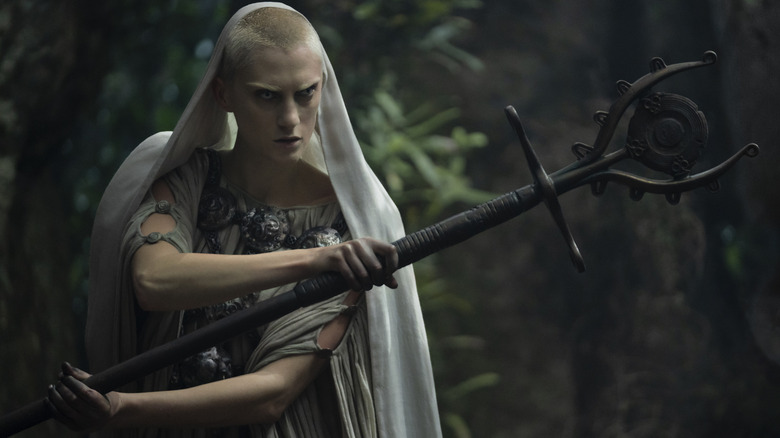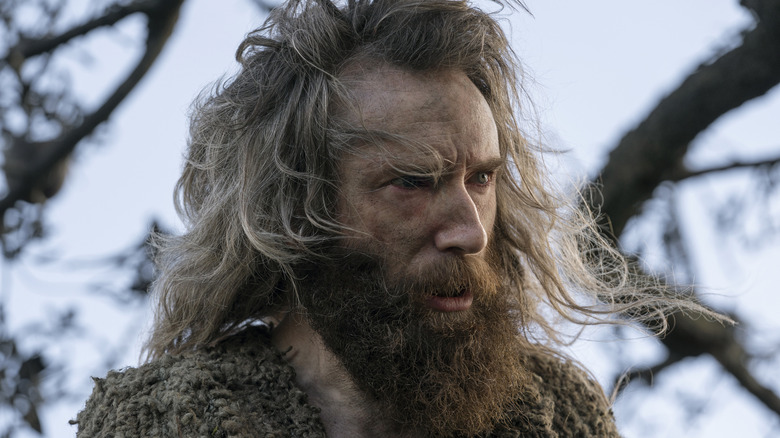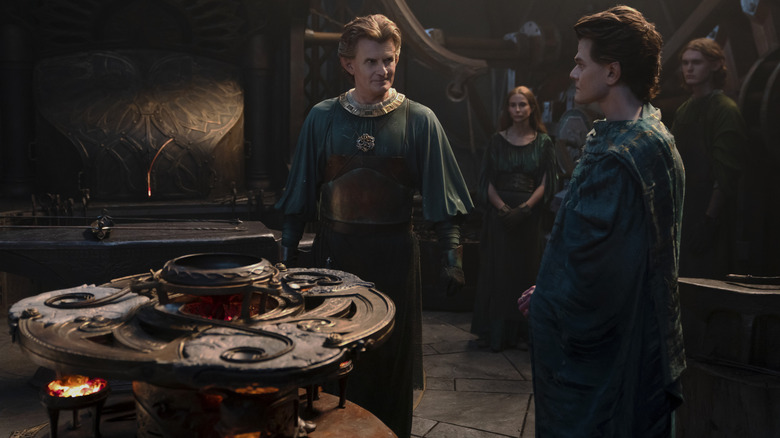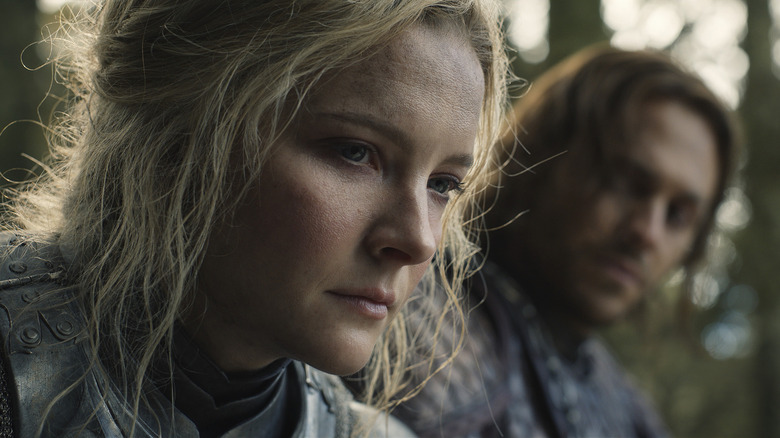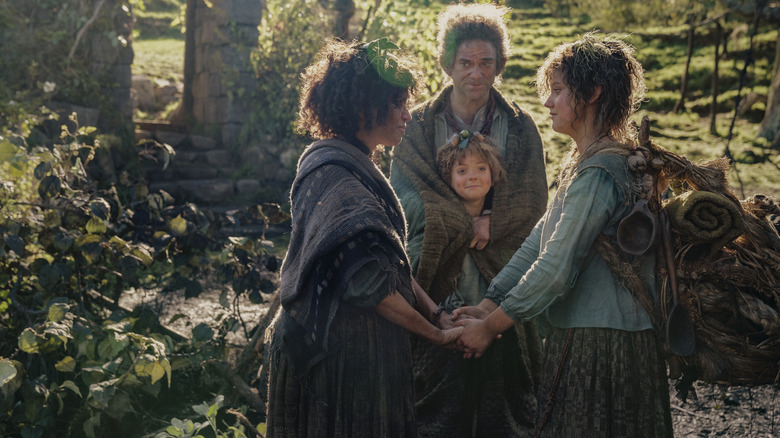The Lord Of The Rings: The Rings Of Power's First Season Comes To An Epic End And All Is Finally Revealed
"How am I to know which lights to follow?" "Sometimes we cannot know until we have touched the darkness."
The premiere episode of "The Lord of the Rings: The Rings of Power" likely sticks out in the minds of most for its cliffhanger ending with the arrival of the mysterious Stranger (Daniel Weyman), giving us a red herring to obsess over for an entire season while the true mystery remained right in front of our noses. The fate of Galadriel (Morfyyd Clark) ended up bearing even greater significance throughout all 8 episodes, as seen in last night's season finale titled "Alloyed," with the elf warrior having continually wavered between her vengeance-driven quest to hunt down the Dark Lord Sauron and her own darker impulses that threatened to overwhelm her again and again. In the end, her own innate sense of goodness and morality won out ... but not without tremendous cost and far greater omens to come than she could ever know.
"The Rings of Power" came to an appropriately epic and stirring end, though by going smaller and more character-driven as opposed to attempting to one-up the harrowing battle sequence featured in "Udûn." Though the episode strains itself a bit by checking in with almost each and every remaining cast member in the ensemble, the stakes feel appropriately world-ending while the actual confrontations we see remain surprisingly insular. The battle between the Stranger, the harfoots, and the mysterious cult members only spans a terribly restrained area of forest and focuses solely on a battle for the soul of the Stranger. The future of the elves comes down to a battle of wills between Galadriel, Elrond (Robert Aramayo), and Celebrimbor (Charles Edwards) as they struggle over how to save themselves with the one precious ore of mithril in their possession. Even Galadriel's fatal mistake with Halbrand (Charlie Vickers) — who, yes, is finally revealed to be Sauron himself — mostly plays out in her mind as opposed to any real physical clash.
By going smaller when most would've expected a "The Return of the King"-sized conclusion, "The Rings of Power" doubled down on what truly made director Peter Jackson's movies such popular and entrenched pop culture darlings in the first place. It was never about the spectacle or deep-seated lore. "The Rings of Power" understood that true power comes from friends reconciling, choosing good, and embarking on adventures together.
Battles without and within
Well, might as well start with this. In one of the finale's multiple fake-outs and deceptions, a fitting course of action given how much of Sauron's activities during this time period in Middle-earth relies on courting suspicion and mistrust, the Stranger is finally given ... well, not a name, per say, but a heavy implication that this was actually the wizard Gandalf all along.
The incredibly obvious revelation that many guessed immediately hardly feels like a cheat, however, given how well the series writers (with this episode credited to "Breaking Bad" and "Better Call Saul" alum Gennifer Hutchison, along with the showrunning/writing duo of J.D. Payne and Patrick McKay) focused on whether the Stranger was bad or good. The early "twist" that he was Lord Sauron himself was certainly shocking, both to the viewers and the Stranger himself (which is why such a risky narrative deception worked so effectively), but this case of mistaken identity pays off beautifully when Nori (Markella Kavenagh) and the rest of the harfoot party catch up with him and coax him into saving their lives, leading to him eviscerating the hooded figures and freeing himself to choose his own destiny.
Sound familiar? It ought to, as this was essentially what Galadriel herself spelled out to young Theo (Tyroe Muhafidin) about battles both "without and within" in the penultimate episode.
This theme echoes throughout much of the episode, most obviously with Galadriel and the Stranger in their own ways, but also in the early scene between Elrond and Galadriel. Impressively, the finale devotes precious screen time to dive headfirst into mending the rift between the two old friends. While Galadriel wrestles with her feelings of inadequacy over fleeing Valinor until she's truly worthy of it, Elrond regrets his part in sending her away in the first place rather than trusting her. Their wonderfully simple conclusion to, basically, just keep swimming rather than allow one or the other to drown in past mistakes immediately gives this hour a shot in the arm, firmly establishing the finale's consistent emphasis on the personal over the seemingly profound.
Existential elves
To describe the entirety of the finale as one that hardly moved the overarching plot forward in significant ways would be misleading, mind you. As far as the elven storyline is concerned, Elrond, Galadriel, and Celebrimbor continuously chafe under the stubborn high king Gil-galad (Benjamin Walker) as they race to find an answer to the impending extinction of their people. Once Galadriel and a mortally wounded Halbrand arrive at the high city from the ruined Southlands, the would-be king's chance meeting with the great elven smith feels a little suspicious right from the start. Just so happening to come up with the "intriguing solution" to their woes, Halbrand neatly inspires a way for Celebrimbor's harebrained scheme involving the forging of a crown infused with life-giving mithril to actually work.
Time runs out, unfortunately, with the eruption of what will become known as Mount Doom further hastening the killing of the mighty elvish tree. But once a perhaps over-ambitious Celebrimbor uses the exact same terminology uttered by Adar (Joseph Mawle) last week, referring to a power "not of the flesh but over flesh" and invoking "the Unseen World," Galadriel's suspicions immediately raise and point her in the direction of Halbrand. Nevertheless, work begins amid the great forge as Halbrand and Celebrimbor spearhead the effort — with Galadriel looking on with grave uncertainty.
Her decision to find out whether he's actually who he says he culminates in a moment where the writers lay it on a little thick, as Halbrand arrives to feign ignorance about how unlikely his path to the elves really was and heap praise upon Galadriel for saving his life in the Sundering Seas back in episode 2. His whispered promise that he'll never forget her help and that "no one else" will sound more like a threat, further implicating the Southlander we took to be an honorable king. When the other shoe finally drops, the results are nothing short of spectacular.
The enemy unmasked
The main thrust of the finale kicks into gear once Celebrimbor and Elrond suffer a setback while binding the mithril with lesser ores, spurring Halbrand to once again intervene and assist in their progress. When Galadriel seeks solitude to wrap her mind around her discovery of how the line of Southlander kings was broken and that Halbrand can't possibly be who he says he is, none other but Halbrand himself shows up to finally confront the suspicious elf. But rather than build to some obligatory one-on-one duel to the death, we instead find ourselves in the childhood flashback sequence in Valinor that the premiere opened with. Greeted by a vision of her long lost brother Finrod (Will Fletcher), whose death motivated Galadriel's relentless quest to find and kill Sauron, he tries to convince her that "peace" was always Sauron's aim.
When she's not fooled at all, she's once again transported back to the raft with the man we once knew as Halbrand. Taking a more direct approach this time, he mentions how Morgoth's death freed him from evil and allowed him to walk along the path of forgiveness to make up for his past actions — the evil deeds he once sneakily alluded to with Galadriel while both were stuck on the raft together.
The restraint to have their argument occur mentally as opposed to physically pays dividends, as he uses her own words against her and tries to make her give up her vengeance and instead sway her to his side with a future ruling together. When he likens "saving" Middle-earth to "ruling" it, she of course rejects his offer. Using her own culpability in saving Sauron against her, Galadriel next appears drowning in the sea like she almost did in the second episode until she's saved by Elrond — with Sauron nowhere to be seen.
Rather than admit responsibility for Sauron's rescue, she instead urges Celebrimbor to make not one, but three great rings for the elves. By the end of this main storyline, "The Rings of Power" cleverly recontextualizes its first rings of power — imbued with the ability to stave off the "blight," preserve the elves, and help them create even mightier works — as a symbolic gesture, forged partly from her brother's own dagger and laying the groundwork for the events that will someday lead to "The Lord of the Rings."
Riddles in the dark and other stray thoughts
- Addressing the Wizard in the Room: Well, after all that endless speculation and breathless theories, the Stranger all but confirms his identity as the lovable Gandalf who will eventually help out a very familiar hobbit in his own quest against Sauron thousands of years later. Many immediately grasped the potential of how "The Rings of Power" could explain how Gandalf finds a soft spot for the "little folk" in the first place, with several callbacks in this episode alone — from Gil-galad's statement of "a fool's hope" to the Stranger's final line of dialogue saying, "When in doubt, Elanor Brandyfoot, always follow your nose" — further adding fuel to the fire. The hooded figures name him as one of the "Istar," which translates to "Wise one" or "wizard," as he tells Nori. When the unlikely pair strike out on their own for the lands of Rhûn, embarking on adventures set to come in the inevitable season 2, it can't help but feel like "The Rings of Power" reaching across time and space to connect the dots with Gandalf putting Frodo on his path in "The Lord of the Rings."
- Rhûn Away: At one point in the episode, we're treated to the line describing how the lands of Rhûn are located "Far to the east, where the stars are strange." Though little more than a throwaway line to most viewers, this is almost word-for-word how Aragorn describes the same location thousands of years later in novel "The Fellowship of the Ring," when he explains to a (much older) Elrond during his great council in Rivendell about his travels across Middle-earth. How's that for synchronicity?
- Naming Conventions: I certainly hope nobody got as invested in those odd hooded figures robed in white as much as fans did with the Knights of Ren in "Star Wars: The Force Awakens." Ultimately, the trio of conjurers and sorcerers never so much as have their names spoken aloud, though the subtitles at least identify each one as the Ascetic (Kali Kopae), the Nomad (Edith Poor), and the Dweller (Bridie Sisson). Their powers were cool, I guess, but their little set piece strayed a little too close to generic high fantasy action than I personally look for from "The Lord of the Rings." In any case, despite their mistakes they at least get one thing right — the Stranger will find more answers in faraway Rhûn, whose people we glimpsed (in rather virulently racist fashion) in "The Two Towers" and "The Return of the King" riding those great war elephants (called oliphaunts or Mûmakil) into battle.
- Gift-giving: Who else's ears perked up once Halbrand called his assistance with the mithril a "gift" to Celebrimbor? This is for the nerds out there, but one of the "many names" that The (Con) Artist Formerly Known As Halbrand alludes to would be Annatar, which in elvish translates to "Lord of Gifts." Though this took place over many, many years in J.R.R. Tolkien's writings, "The Rings of Power" introduces this concept as Halbrand plays a key role in secretly guiding the elves towards the hidden art of ring-making — which he's known to have done in his "fair" visage in the source material, as opposed to spiky armor and flaming eyeballs. Halbrand and Galadriel shippers out there, you have my utmost condolences.
- The Lore of Númenor: The Númenorean check-ins during the finale felt a little too inconsequential to include in the main recap, but they'll certainly play a larger role to come in future seasons. Isildur's sister Eärien (Ema Horvath), mostly a forgettable non-entity to this point, is tasked with drawing a portrait of the sickly King Tar-Palantir (Ken Blackburn). Mistaken for a young Queen Míriel (Cynthia Addai-Robinson), Eärien is encouraged in his dying breaths to look into the palantír and see the vision of doom herself that's coming for Númenor, lest they go back to their "old ways." When the king is on his deathbed and Pharazôn goes on about achieving "immortality" through grand tombs, this evokes a speech by Gandalf in "The Return of the King" (the extended edition, at least) where he talks about the decline of Gondor, which was repurposed from dialogue in the novels referencing the fall of Númenor.
- Farewell, Sadoc: "The Rings of Power" has proven curiously hesitant to cull the ranks of its unwieldy ensemble over its inaugural season (if you really think Maxim Baldry's Isildur is actually dead, I have an island kingdom to sell you), but one victim hits hard in the form of Sadoc's (Lenny Henry) heroic death. At least he got to see his fellow harfoots temporarily fend off the hooded figures with stones (a halfling tradition!) before being given the dignity of a peaceful death watching the sun rise once last time.
- Where Have We Heard That Before? In another neat instance of "The Rings of Power" drawing direct parallels to "The Lord of the Rings" in ways that further enriches the text, the writers have Halbrand in full "Satan tempts Christ" mode as he offers Galadriel power immeasurable if only she rules by his side. One tactic he uses perfectly recreates the dialogue, "Stronger than the foundations of the earth," which Galadriel of course repeats during the events of "The Lord of the Rings" when she turns into a vision of what might happen should she be given the One Ring. Now, it'll be fun to retcon this so that she's actually remembering and quoting what Halbrand/Sauron himself once told her all those ages previously.
- Credit Where It's Due: Three cheers for director Wayne Che Yip, whose work on the series consistently brought the epic and heightened tone and visuals established by J.A. Bayona in the introductory pair of episodes. I'd love to see Bayona return for season 2, but he, Che Yip, and Charlotte Brändström all proved that they have what it takes.
- Thank you! And with that, we've drawn to the end of our /Film recaps for "The Rings of Power." I hope you've had as much fun reading these as I had writing them and, ideally, we'll be right back here once again for another prolonged adventure when season 2 is finally upon us. Until then, thank you all so much for joining me on this unexpected journey week after week.
